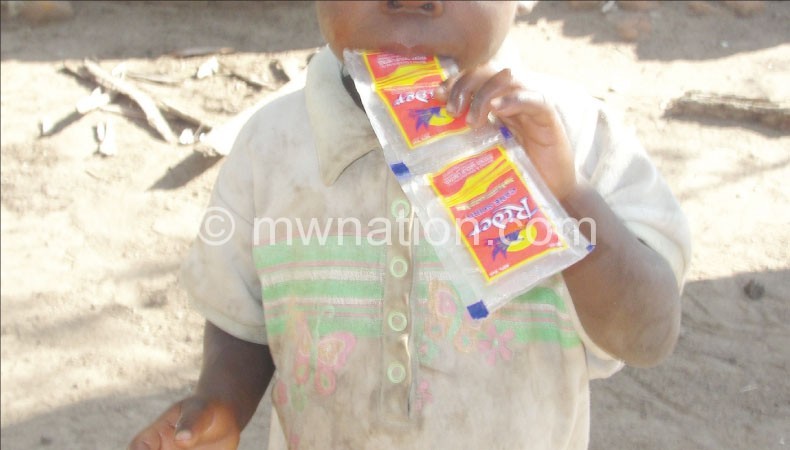Losing the sachets battle

On June 26, the world commemorates International Day Against Drug Abuse. As Malawi struggles to control the sale of alcohol in sachets to underaged, ALBERT SHARRA explores why this is proving a tough battle.
For teachers at Zingwangwa Secondary School in Blantyre, morning classes are better than afternoon ones. Despite the afternoon classes having more absentees, attendees are hostile.
In an earlier interview with Weekend Nation, the school’s head teacher Catherine Chisale said the students are disciplined and orderly in the morning.
“But as hours pass, especially after break, you begin to see changes in their conduct. We know the problem through observing oscillations in the behaviour of the children,” said Chisale.
She said she is aware that some students at the school take alcohol during break time.
“Sachets are being sold everywhere and are so cheap that many students can afford them. In the afternoon, many students become rude and hostile towards teachers and fellow students, their eyes are red and they always want to dominate others. Some become sleepy even during examinations, while others abscond classes. The worst they do is vandalism,” says Chisale.
In search of market, some vendors sell sachets and cigarettes close to schools, making them easily accessible to pupils.
During a visit to some of the schools in Blantyre, some empty sachets could be seen disposed of among the waste in rubbish pits.
It is no longer a hurdle for youths to access sachets. Apart from shops erected near schools and in residential areas, alcohol sachets are seen during football matches at stadiums and other entertainment venues where they are sold to anyone without restrictions. The 100 millilitres sachets currently cost between K70 and K100 depending on the brand.
Drug Fight Malawi, a non-governmental organisation NGO) whose aim is to fight drug abuse, notes that statistics of children exposed to and taking alcohol continue to increase.
Ironically, this is against the country’s laws. Section 23 subsection 4 (c) of the Constitution protects children from anything harmful to their health, whether physical, mental, spiritual or social.
The battle against the production and supply of sachets is not new. Malawi needs to question its position on the fight against drug abuse, particularly where it affects children. This year’s International Day Against Drug Abuse is being commemorated under the theme ‘Make health your new high in life, not drugs’.
Executive director for Drug Fight Malawi, who is also secretary for Alcohol Policy Alliance, Nelson Baziwelo Zakeyu, says Malawi seems to be losing this battle against alcohol abuse.
In 2007, the NGO came up with a draft National Alcohol Policy to fight the practice and other flaws in the distribution of alcohol and drugs. The policy was developed to complement the Drug Control Policy. It is designed to deal with the practice and protect children from accessing alcohol and beer drinking places. It would ensure that all local brewers are licensed for monitoring purposes by government and that the production and sale of sachets is banned.
“If the draft National Alcohol Policy is passed and probably an enactment of relevant laws is made by Parliament, then the selling of sachets to children would be solved permanently,” says Zakeyo, adding the two policies were submitted to the ministries of Health and Home Affairs.
He adds his office recently conducted research which revealed that alcohol sachets are mostly abused by students in boarding schools. He also said the research revealed that Form One students are being forced to take sachets and Indian hemp by senior students, adding that some of them become addicted to the substances.
Malawi Bureau of Standards (MBS) has been against the sale of sachets and three years ago, they closed Ask Beverages, manufacturers of alcoholic spirits, because of using non-food grade alcohol to make the products and packaging them in sachets. However, the producers obtained a court injunction stopping the MBS order.
“Our hands are tied because the case is in court. However, our call goes to local authorities because they are empowered to control the liquor business through the laws in Malawi. Chapter 50:07. Section 69 says every local authority may within the area of such local authority establish, maintain and operate beer-halls where opaque beer may be sold to the public by such local authority or by holders of current valid retail permits with the permission and under the supervision and control of such local authority. If this is adopted, no one can sale sachets to underaged children and illegally,” says MBS executive director Dovlin Chokazinga.
As Malawi struggles to win the battle, neighbours Zambia sings a different story. After years of the fight, the Zambia government enacted strict policies that control alcohol and drug abuse.
Zakeyu says the National Alcohol and Drug Control policies can simultaneously achieve this with effective implementation of the provisions in the policies.
Davis Sado, spokesperson for the Ministry of Home Affairs admits that his office is keeping draft Drug Control Policy and says the enactment process has been delayed because they were reviewing it. However, he could not give the actual time it will be submitted to the cabinet.
While highlighting that unavailability of various public health policies and knowledge gaps continue to affect efforts in fighting the process, spokesperson for Ministry of Health, Henry Chimbali said they have made considerable progress on National Alcogol Policy.
“What is remaining is to submit the draft policy to top level senior servants, at inter-ministerial level and this is a grouping of all principal secretaries in government because the policy cuts across several areas of government operations. Once we get an approval from this gathering, we will submit it to Cabinet. We hope this will be done in the first months of the financial year 2014/2015,” he says.





